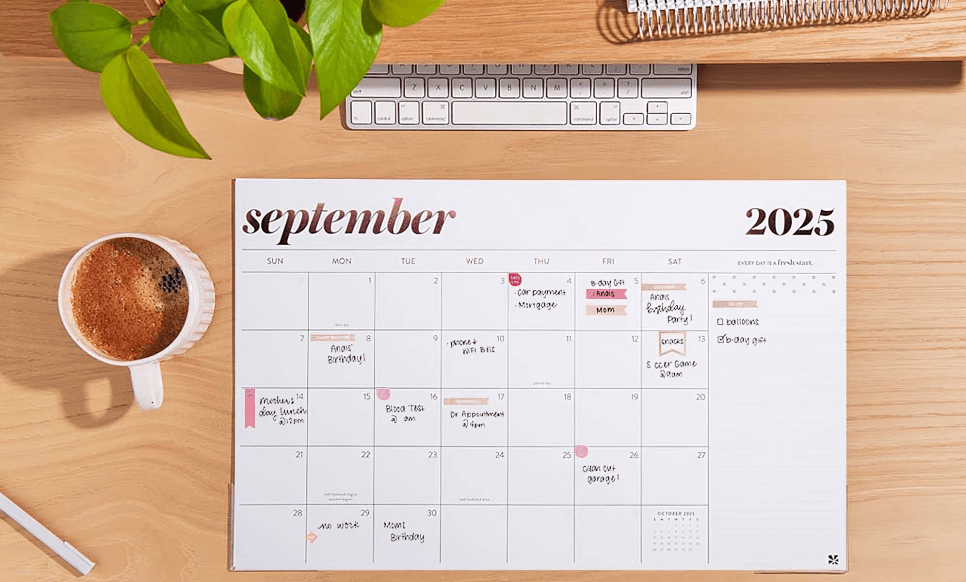
“
Handling work stress effectively is crucial for maintaining both mental well-being and professional productivity. By adopting effective stress management techniques, you can improve your work-life balance and perform at your best in the workplace.1
1
”
Engaging in regular physical exercise can reduce stress hormones and increase endorphins, leading to improved mood and better stress management at work, helping you stay energized.1
Establishing clear personal boundaries between work and personal life helps prevent burnout by allowing time for relaxation and personal activities, which are essential for mental health and overall well-being.2
Practicing mindfulness and meditation exercises can enhance focus, reduce anxiety, and promote a sense of calm, making it easier to handle workplace challenges and maintain productivity during stressful periods.3
Maintaining a clutter-free environment can reduce distractions and create a more conducive workspace for productivity and stress reduction, ultimately fostering a healthier work atmosphere.4

Regularly taking short mental breaks during work hours allows the brain to rest and recharge, improving concentration and reducing feelings of overwhelm while maintaining high performance throughout the day.
Engaging in deep breathing exercises, such as the 4-7-8 technique, can activate the body's relaxation response, lowering heart rate and reducing stress, providing immediate relief during tense situations.5
Seeking support from work colleagues or supervisors when feeling stressed can provide different perspectives and solutions, alleviating the burden of stress while promoting a collaborative.6
Incorporating healthy eating habits, like consuming balanced meals and staying hydrated, supports overall well-being and helps the body cope with stress more effectively, improving energy levels.7
Utilizing Employee Assistance Programs (EAPs) can provide access to counseling and resources, offering professional support for managing work-related stress and fostering a sense of support.8

Engaging in hobbies or leisure activities outside of work can provide a creative outlet and a break from work-related stressors, promoting relaxation and allowing the mind to recharge for better focus.
Practicing gratitude by acknowledging achievements can shift focus from stressors to positive aspects, improving overall job satisfaction, boosting morale, and fostering a mindset of growth and appreciation.9
Learning to say no effectively prevents overcommitment, allowing individuals to manage workloads and reduce stress, preserving energy, and ensuring high-quality work without overwhelming yourself.10
Establishing a consistent routine can provide structure, reducing uncertainty and helping to manage stress levels by creating predictability in daily tasks and promoting efficiency and focus.11
Engaging in progressive muscle relaxation techniques can alleviate physical tension associated with stress, promoting a sense of calm and relaxation, helping you feel more comfortable and less anxious at work.12
Seeking feedback from supervisors regularly can provide clarity on expectations, reducing anxiety and improving performance, allowing you to address concerns early and maintain a strong work-life balance.13
Engaging in creative stress relief activities, such as drawing or writing, can serve as an emotional outlet, reducing stress levels and helping the brain reset, allowing for clearer thinking and better performance.14

Utilizing time management tools, like calendars or task lists, can help organize tasks and reduce feelings of being overwhelmed, ensuring priorities are met and stress is minimized throughout the day.
Taking vacations or mental health days allows for rest and recovery, preventing burnout and reducing stress, recharging energy levels for long-term productivity, and promoting overall well-being. 15
Setting aside time for self-care activities, such as reading or taking a bath, can promote relaxation and reduce stress, offering opportunities to unwind and return to work feeling refreshed and focused.16
Seeking professional therapeutic help from a counselor can provide strategies and support for managing chronic work-related stress, helping you build resilience and develop healthy coping mechanisms. 17


